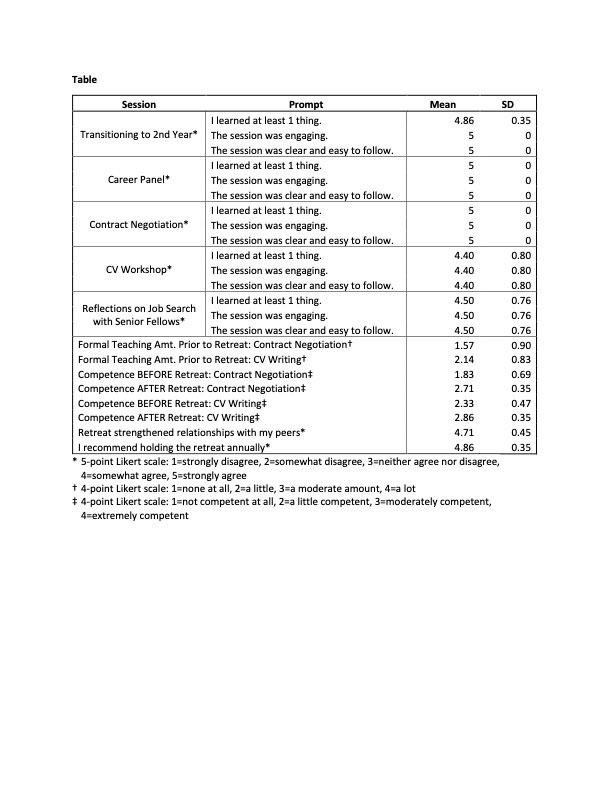Session Information
Session Type: Poster Session A
Session Time: 1:00PM-3:00PM
Background/Purpose: The transition from the 1st to the 2nd year of rheumatology fellowship presents new challenges and opportunities. Most training programs have intense clinical schedules in the 1st year, which allows fellows to focus on scholarly pursuits in the senior years of fellowship. Clinical work, while demanding, also provides for a structured and predictable schedule. Scholarly work requires a different skillset that necessitates self-motivation, expectation setting, and time management. In addition to scholarly work, the transition to the 2nd year of fellowship signifies a renewed focus on career planning. In the UCSF Rheumatology Fellowship program, we identified a need to assist fellows in specifically preparing for this critical progression in training.
Methods: The fellowship leadership team, comprised of the program director, associate program director, and chief fellows, developed a Transitions Retreat to address the needs identified by fellows and faculty. The UCSF Rheumatology Fellowship consists of 4 fellows per year (2 clinical track, 2 research track). All fellows have an identical clinically-focused 1st year of training. The 2nd and 3rd years of fellowship are focused on scholarly work. The Transitions Retreat was a five-hour session held in May 2022. The event included 5 sessions: (1) “Transitioning to 2nd Year: Expectation Setting & Time Management”; (2) “Career Panel with Fellowship Alumni”; (3) “Contract Negotiation”; (4) “CV Workshop”; and (5) “Reflection on the Job Search with Senior Fellows.” Time for community building was also included. All fellow attendees were surveyed on their perceptions of the retreat using a de-identified Qualtrics survey.
Results: All four 1st year fellows, three 2nd year fellows, and one 3rd year fellow attended the retreat. 7/8 fellows completed the retreat evaluation. 4/7 were research track. Sessions were ranked highly for content, engagement, and clarity, with a mean of 4.77 on a 5-point Likert scale (Table). Fellows reported having “a little” (mean 1.86 on a 4-point Likert scale) prior formal teaching on contract negotiation and CV writing. Self-assessment of competence on a 4-point Likert scale before and after the retreat improved from a mean of 1.83 to 2.71 in contract negotiation and from 2.33 to 2.86 in CV writing. Fellows strongly agreed that the retreat strengthened relationships with their peers and recommended holding the retreat annually (mean 4.71 and 4.86, respectively on a 5-point Likert scale). Areas for improvement included expanding the career panel to include a diversity of industry and community jobs, and additional guidance on the basic/translational science path in fellowship and career.
Conclusion: The UCSF Rheumatology Fellowship Transitions Retreat was highly reviewed by fellows for content and engagement, and improved self-assessment of competence in areas of focus not well addressed in training. Areas for improvement included an expanded career panel as well as more specific guidance for those in the basic/translational science pathway. The UCSF experience could serve as a model for other fellowship programs to help fellows bridge this critical juncture in training.
To cite this abstract in AMA style:
Thomashow M, Murthy V, Gensler L, Goglin S. A Transitions Retreat: Preparing Rheumatology Fellows for Career Planning and the Scholarly Phase of Training [abstract]. Arthritis Rheumatol. 2022; 74 (suppl 9). https://acrabstracts.org/abstract/a-transitions-retreat-preparing-rheumatology-fellows-for-career-planning-and-the-scholarly-phase-of-training/. Accessed .« Back to ACR Convergence 2022
ACR Meeting Abstracts - https://acrabstracts.org/abstract/a-transitions-retreat-preparing-rheumatology-fellows-for-career-planning-and-the-scholarly-phase-of-training/

